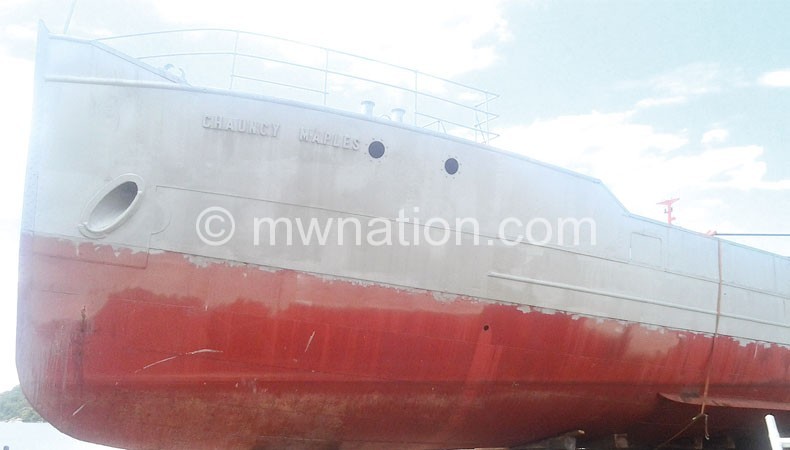Govt’s double deals on ship backfire

Malawi Government’s decision to sell giant historical vessel Chauncy Maples to Mota-Engil (M-E) after it had already authorised a British registered charity to modify the ship into a mobile clinic brought misunderstandings that have delayed services to the poor.
The wrangle over the project’s ownership between Mota-Engil and the charity— Chauncy Maples Malawi Trust (CMMT)—has derailed the hospital initiative that targeted to serve people living in areas with poor or non-existent transportation.
Also at stake is a £1.8 million (K1.2 billion) investment that CMMT mobilised for the project, of which £1.2 million (K780 million) has already been spent, yet the ship is just idling away on the beaches of Monkey Bay in Mangochi.
The bone of contention is over control of the mobile clinic as the trust conceptualised the idea and the funding process, but before the refitting project took off, government sold the vessel to Mota-Engil, which holds the concession to manage Malawi Lake Services (MLS).
While Mota-Engil, CMMT and the Ministry of Health say they have resolved their differences, the Mangochi District Health Office bemoans the delay, saying thousands of would-be beneficiaries will suffer needlessly as a result.
A Nation on Sunday recent visit to the Monkey Bay harbour found that six years after the decision was made to turn the decommissioned vessel into a clinic, the ship looks deserted and, as at Easter, there was no one working on it—an indication that the clinic’s originally planned launch for end this year are way off the mark.
A member of Chauncy Maples Technical Committee—comprising sponsors and government officials—confided in Nation on Sunday that the major stumbling block to the progress of the project was the disagreements between the trust and Mota–Engil over who would manage the mobile clinic.
“Technically the project has stopped because the two organisations would not agree who will manage the project. While the CMMT believes they are to manage the mobile clinic, Mota-Engil says they have to manage the clinic because they own the vessel,” he said.
On its website, CMMT explains that it is reviewing other options after encountering new technical problems and increased costs in the last six months.
“As a result, we are currently reviewing the options to achieve our aim of bringing healthcare to the villages of Lake Malawi, while at the same time examining the best way to use Chauncy Maples,” reads the statement.
But in a written response to a questionnaire, chairperson of the trust Colin Hayton said they have resolved the differences and are now working together with Mota-Engil on the final stages of the renovation.
In an e-mail response, Mota-Engil general manager Jose Dinis da Silva also said the differences have been resolved.
He said the two organisations have agreed that CMMT will be responsible for the renovation of the vessel while Mota-Engil’s interest will be after the completion of renovation to provide funding and running costs for the vessel to operate on Lake Malawi providing health services to the people within Malawi shores.
Da Silva added that due to the charitable laws in UK, CMMT could not develop its programme in partnership with a private profitable orientated company: “Therefore, the parties have agreed that the M-E/MSC [Malawi Shipping Company] participation would be replaced by a Manuel Antonio Foundation.”
Ministry of Health spokesperson Henry Chimbali admitted that there have been delays in completing the project and that it has affected the ministry’s plans to provide health care services to people along the lakeshore as envisaged.
“The project involved three parties—the Ministry of Health, the Chauncy Maples Malawi Trust and Mota-Engil. Therefore, there were some issues that required consensus, especially between Mota-Engil and the trust regarding the renovations of the ship,” he said. “We have been in constant talks with the Chauncy Maples Malawi Trust who are fundraising for the project and they have confirmed with us that the money that was collected is still intact and will be used for the purposes that it was intended for,” he said.
Mangochi district health officer (DHO) Ethwako Phiri said the Chauncy Maples mobile clinic could have greatly improved access to health services by communities that cannot be reached by road.
“We hire boats to visit these communities once a month. The MV Chauncy Maples project would have improved our outreach. It could have been safer, with more health workers and a wide range of services on board,” she said.
According to the Ministry of Health, in Mangochi it is Mbvunguti and Gome islands that desperately need the mobile clinic.
At Mbvunguti, the ministry reaches out to 2 368 people through the monthly visits, a trip that costs more than K120 000—K45 000 for hiring a boat and K75 510 for 90 litres of fuel needed for the round trip.
At Gome Island, there are 470 people where a monthly round trip costs government K83 900.
The vessel has been in the country for 112 years. It was laid up in 1992.





